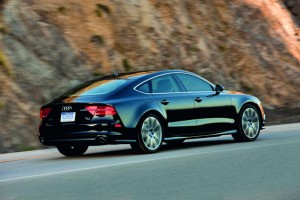With automakers showing a renewed interest in hydrogen, Audi appears to be the latest manufacturer to be looking to develop a car that can use the light, clean-burning fuel.
According to a report from Europe, Audi plans to begin testing a prototype fuel-cell vehicle based on its popular A7 coupe-like sedan. It would become the latest addition to an expanding line-up of “tron” vehicles from Audi using alternative propulsion systems including battery-power and compressed natural gas.
The new hydrogen-powered A7 would debut in August, according to Britain’s Autocar magazine, quoting an interview with Audi’s technical director Wolfgang Durheimer.
Hydrogen can be used to power a vehicle in several different ways. Audi’s German rival BMW has been experimenting with a 7-Series in which the lightweight gas is burned in a modified internal combustion engine. The approach has the advantage of allowing a motorist to switch to gasoline if the hydrogen tank runs low.
In Audi’s case, the maker has opted for a fuel-cell system which can be used to run electric motors – essentially a refillable battery car. A fuel cell stack combines hydrogen and oxygen from the atmosphere to produce electricity. The only exhaust gas is water vapor.
Audi and its parent Volkswagen AG have experimented with fuel cell technology before, notably as part of a 2009 project. The Audi Q5 HFC used twin electric motors to power its wheels.
Other manufacturers including Honda, Mercedes-Benz, Toyota and General Motors either are or soon plan to launch test fleets using hydrogen fuel-cells.
The technology has significant advantages over battery power. Though a fuel-cell vehicle, or FCV, can use the same electric drivetrain, its storage tanks can be quickly refilled, essentially giving the vehicle unlimited range.
There are drawbacks, however, including the lack of an established hydrogen production and storage infrastructure. And onboard storage is a challenge. Manufacturers have been experimenting with a variety of different approaches, including cryogenically cooled liquid hydrogen, compressed hydrogen and even the use of materials like hydrides that can store the fuel in a solid form.
Due to those challenges, the industry moved away from hydrogen over the last decade, putting an emphasis on battery power. But due to the limit range and high cost of batteries there has been renewed interest in fuel-cell technology.
The German government recently approved a plan to create alternative power service stations that would eventually establish a nationwide network of facilities where motorists could tank up on hydrogen or recharge their batteries.
In the U.S., meanwhile, the Obama Administration is showing renewed interest in funding hydrogen research after initially shifting millions of dollars of aid to battery development programs.
Audi has not said what its long-term plans are for the hydrogen A7 but the maker has introduced several “tron” models in recent months, including both a plug-in hybrid A3 e-tron and a CNG-powered A3 g-tron.


I hope fuel cell tech turns out to be viable and practical. It could compensate for some of the stupidity in DC.